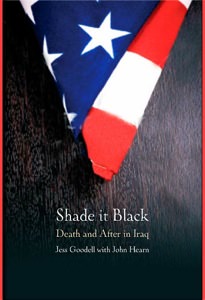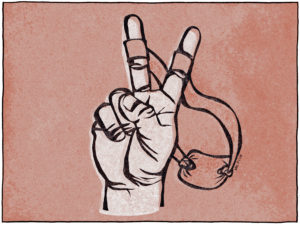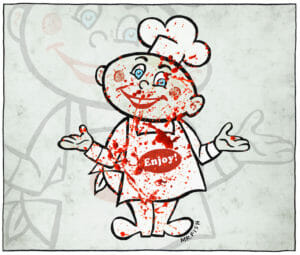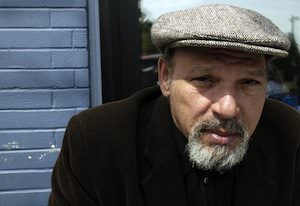‘Shade It Black’: The Bodybaggers of Iraq
Jess Goodell volunteered when she was a Marine to work in the corps’ mortuary affairs unit in Iraq. Her job was to collect the bodies and body parts of fallen fellow Marines. She wrote a book about the experience called “Shade It Black: Death and After in Iraq.” Here are excerpts from Goodell's book and Chris Hedges’ interview with the author, read by classically trained actor and Truthdig contributor Eunice Wong.
Jess Goodell volunteered when she was a Marine to work in the corps’ mortuary affairs unit in Iraq. Her job was to collect the bodies and body parts of fallen fellow Marines. She wrote a book about the experience called “Shade It Black: Death and After in Iraq.” Here are excerpts from Goodell’s book and Chris Hedges’ interview with the author, read by classically trained actor and Truthdig contributor Eunice Wong.
This reading originally aired on Truthdig Radio.
Transcript:
We went through everything. We would get everything that the body had on it when the Marine died. Everyone had a copy of The Rules of Engagement in their left breast pocket. You found notes that people had written to each other. You found lists. Lists were common, the things they wanted to do when they got home or food they wanted to eat. The most difficult was pictures. Everyone had a picture of their wife or their kids or their family. And then you had the younger kids who might be 18 years old and they had prom pictures or pictures next to what I imagine were their first cars. Everyone had a spoon in their flak jacket. There were pens and trash and wrappers and MRE food. All of it would get sent back [to the Marines’ homes].
We all had the idea that at any point this could be us on the table. I think Marines thought that we went over there to die. And so people wrote letters saying ‘If I die I want you to know I love you.’ ‘I want my car to go to my younger brother.’ Things like that. They carried those letters on their bodies. We had a Marine that we processed and going through his wallet he had a picture of a sonogram of a fetus his wife had sent him. And a lot of Marines had tattooed their vital information under an armpit. It was called a meat tag.
Some things were not uncommon enough, like a suicide note. We had a Marine who was in a port-a-john when he blew his face off. We had another Marine who shot himself through the neck. Often they would do it in the corner of a bunker or an abandoned building. We had a couple that did it in port-a-johns. We had to go in and peel and pull off chunks of flesh and brain tissue that had sprayed the walls. We sent the suicide notes home with the bodies.
We had the paperwork to do fingerprinting, but we started getting bodies in which there weren’t any hands or we would get bodies that were just meat. Very quickly it became irrelevant to have a fingerprinting page to fill out. By the time we would get a body it might have been a while and rigor mortis had already set in. Their hands were usually clenched as if they were still holding their rifle.
We received a call one day that an IED exploded under an Army convoy that was crossing a bridge. It had literally shot a seven-ton truck over the side and down into a ravine. We had on our white plastic suits and face masks and our gloves, and I was with a Marine named Pineda. I was coming around the Humvee, and there was a spot on the ground that was a circle. I looked at it and I thought well, something must have exploded here, or near here. I looked in and saw a boot. Then I noticed the boot had a foot in it. The body of the assistant driver was trapped in the vehicle. All of his body was in the vehicle; we had to crawl in there to get it out. Pineda and I pulled the burnt upper torso from the truck. Then we removed a leg. Some of the remains had to be scooped up by putting our hands together as though we were cupping water. That was very common. A lot of the deaths were from IEDs or explosions. You might have an upper torso but you needed to scoop the rest of the remains into a body bag. It was very common to have body bags that when you picked them up they would sink in the middle because they were filled with flesh.
Our platoon was to the Marines what the Marines are to much of America: We did things that had to be done but no one wanted to know about. The other Marines knew what we did, but they did not want to think it could happen to them. We were different from the other Marines. The smell of death permeated our clothes, hair, skin, fingers. Our cammies would be stained with blood or with brains. When you scoop up the meat it often would get on the cuffs of our shirts. You could smell it, even after you took off your gloves. We weren’t washing our cammies every day. Your cuff comes to your face when you eat. We had a constant smell like rotten meat, which I guess is what it was since often the bodies had been in the sun and the heat for a long time.
The sun does horrible things to dead skin. It makes the skin slide off the body; when the man is lifted, the skin detaches itself from the layer beneath and slides around on itself. We lost two men from our original platoon who said that they couldn’t, or wouldn’t, do it anymore, and left. One would take a box of Nyquil tablets every day and drink as much cold medicine as he could get his hands on, but that only seemed to make matters worse. He had gone out on a particularly difficult convoy, to a tank that had been blown up, obliterated except for the tracks, leaving thousands of body parts, fingers and testicles and ears and tiny scraps of tissue to be collected. It was shortly after that when I heard that he was medevaced out.
One of our tougher days occurred after a platoon of Marines was on a security patrol. When they finished, they did a head count and realized that two Marines were missing. An investigation charted the route the platoon had followed, and we were sent out to find them. At one point, the Marines were walking along the shore of a lake. Navy divers accompanied us, and soon they found the two. By the time they were pulled from the lake, they had been submerged for quite a while. The water made the remains swell. One man was so bloated and misshapen that we had difficulty carrying him properly in the litter. His neck was as wide as his bloated head, and his stomach jutted out like a barrel. His testicles were the size of cantaloupes. His face was white and puffy and thick. Not fat, but thick. It was unreal. He looked like a movie prop, with thick, gray, waxy skin and the thick purple lips. We couldn’t stop looking at these bodies because they were so out of proportion and so disfigured and because, still, they looked like us.
One time, several Marines were killed at once. Our Marines returned to the bunker with seven or eight body bags filled with flesh. We had clean body bags set up so we could sort the flesh. Sometimes things come in with nametags. Or sometimes one is Hispanic and you could tell who was Hispanic and who was the white guy. We tried separating flesh. It was ridiculous. We would open a body bag and there was nothing but vaporized flesh. There were not four hands or a whole leg in a bag. We tried to distribute the mush evenly throughout the bags. We had the last body bag come in. We opened it up and it was filled with the heads. I looked at four before looking away. Not only did we have to look at them, we had to pick them up and figure out who it belonged to. The eyes were looking back at us. We saw so much throughout the eight months of the program, and we managed to get used to a lot of it. But the heads worked the other way. They affected us more strongly as time passed.
I sent an email to my mother about what was happening with the faces. I told her about one Marine in particular who had been at the bunker for a couple of days, and how I was getting a very bad feeling from him. I had this feeling that something awful had occurred. The way he had come in and stiffened he had this look that made my stomach curl. It looked angry. Other faces looked fearful and hurt, as though they had received death. But this face looked like he had given death. Not wanting to alarm my mother, I was a little vague about the impact he was having on me. Well, she assumed I was talking about a live Marine, and offered me advice on what I should do to avoid him and how I should report him to the higher-ups. And later I noticed I had addressed my email to ‘mommy.’
There was always a heaviness in the air. It felt like I was being watched. We all started hearing and feeling the souls of the dead we had processed and housed. We would feel hands on our shoulders or hands on our heads. Everyone had stories of sounds they heard or things they had felt. One time, the base was on high alert because intel said we were going to be attacked that night. The chief warrant officer called every Marine to the bunker and told us we were all going to sleep there that night. Ten or 12 of us wouldn’t have a place to sleep, so several of us tried to sleep on the litters—what we carried the remains on. And suddenly one Marine flew off his litter, as though he had been catapulted. He swore he had been pushed off. Strong, fearless, exhausted men stood by their empty litters, shaken and unable to get back on. We had an entire bunker to sleep in that night, but we ended up together in one corner. Combat-hardened Marines.
On another night, Pineda and I were assigned to process a Marine. He was fully dressed in his cammies and his whole body was intact. His hands were lying folded across his stomach. I looked at his chest and saw that it was moving. I spun around and hid. He wasn’t dead. He wasn’t dead, and I didn’t know what to do. The doc said ‘Just wait.’ ‘Just wait? Wait for what?’ I asked. ‘There’s nothing we can do,’ the doc said. ‘Just wait.’ ‘People don’t wait for this sort of thing,’ I protested to Pineda. ‘What are we waiting for? What if this Marine was your brother, would we wait?’ Pineda and I stood there for a couple of minutes that passed like hours, until the young man died. I stormed out of the bunker—I just walked out, which is something Marines cannot do. But I was so angry. And I was just a kid, who two or three years earlier had been playing the saxophone in high school band.
Every single Marine I know goes to Iraq to help. While I was there, that is what I thought. That is why I volunteered. I thought I was going to help the Iraqis. I know better now. We did the dirty work. We were used by the government. The military knows that young, single men are dangerous. We breed it in Marines; we push the testosterone; we don’t want them educated; they were deprived of a lot, and rewarded with very little. It keeps us at ground level; we cannot question anyone; we do what we are told.
I am still in contact with most of the people I knew. They are not coping. One lives in VA [Veterans Affairs], constantly seeing psychologists and psychiatrists. One was kicked out of the Marines for three DUIs. Another was kicked out because he took cocaine. Those who have gotten out are living below the poverty level. And what people do to cope is re-enlist. When they re-enlist they do better. They function. I am the only one who went to school of the 18 Marines in Mortuary Affairs. But I am in counseling at the VA. I have been diagnosed with PTSD, anxiety, depression and substance abuse. What separates me from them is that I have a great support system and I found my salvation in my education.
War is disgusting and horrific. It never leaves the people who were involved in it. The damage is far greater than the lists of casualties or cost in dollars. It permeates lifestyles. It infects cultures and people and worldviews. The war is never over for us. The fighting stops. The troops get called back. But the war goes on for those damaged by war.
I received a text from one Mortuary Affairs Marine after he tried unsuccessfully to commit suicide: ‘I’ve got $2,000 in the bank,’ his message read. ‘Let’s meet in NYC and go out with a bang.’
Before we left camp TQ, every Marine was told to see a counselor. There was no debriefing, there was no attempt to communicate with us in a therapeutic way, or to encourage us to talk to each other. He didn’t tell us that what we saw and did in Iraq we’d never forget. He didn’t say that the images would keep us awake all night in a sweat, or that we’d never fully rid ourselves of the smell of death, or that we wouldn’t be able to eat or leave our parents’ house or our own apartments for months, or that we’d shoot at neighborhood kids from a window or pop 60 pills a day, or wander the streets of our hometown in a stupor. The counselor didn’t tell us that whole spheres of our lives and basic aspects of ourselves were gone.
For more on Jess Goodell’s book, go to ShadeItBlack.com. Eunice Wong, who edited and performed the piece you just heard, can be found at EuniceWong.com.
Your support is crucial…With an uncertain future and a new administration casting doubt on press freedoms, the danger is clear: The truth is at risk.
Now is the time to give. Your tax-deductible support allows us to dig deeper, delivering fearless investigative reporting and analysis that exposes what’s really happening — without compromise.
Stand with our courageous journalists. Donate today to protect a free press, uphold democracy and unearth untold stories.






You need to be a supporter to comment.
There are currently no responses to this article.
Be the first to respond.